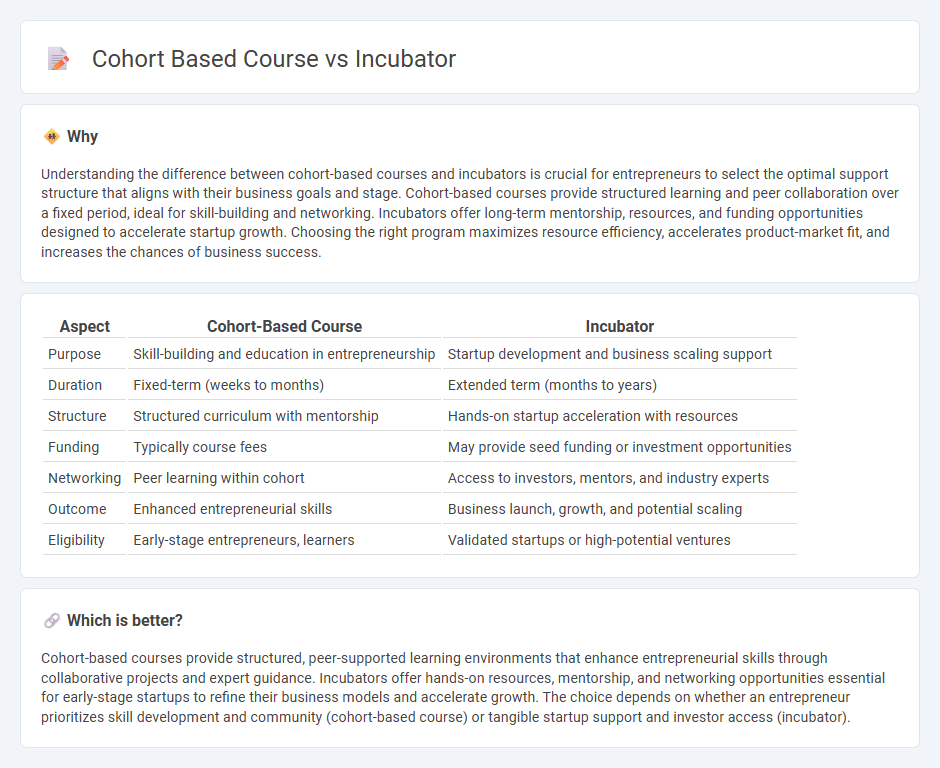
A cohort-based course on entrepreneurship offers structured learning with peer collaboration, mentorship, and real-time feedback, ideal for aspiring founders seeking guided skill development. Incubators provide startups with resources such as office space, funding opportunities, and industry connections, focusing on accelerating business growth through hands-on support. Discover how each path can uniquely accelerate your entrepreneurial journey.
Why it is important
Understanding the difference between cohort-based courses and incubators is crucial for entrepreneurs to select the optimal support structure that aligns with their business goals and stage. Cohort-based courses provide structured learning and peer collaboration over a fixed period, ideal for skill-building and networking. Incubators offer long-term mentorship, resources, and funding opportunities designed to accelerate startup growth. Choosing the right program maximizes resource efficiency, accelerates product-market fit, and increases the chances of business success.
Comparison Table
| Aspect | Cohort-Based Course | Incubator |
|---|---|---|
| Purpose | Skill-building and education in entrepreneurship | Startup development and business scaling support |
| Duration | Fixed-term (weeks to months) | Extended term (months to years) |
| Structure | Structured curriculum with mentorship | Hands-on startup acceleration with resources |
| Funding | Typically course fees | May provide seed funding or investment opportunities |
| Networking | Peer learning within cohort | Access to investors, mentors, and industry experts |
| Outcome | Enhanced entrepreneurial skills | Business launch, growth, and potential scaling |
| Eligibility | Early-stage entrepreneurs, learners | Validated startups or high-potential ventures |
Which is better?
Cohort-based courses provide structured, peer-supported learning environments that enhance entrepreneurial skills through collaborative projects and expert guidance. Incubators offer hands-on resources, mentorship, and networking opportunities essential for early-stage startups to refine their business models and accelerate growth. The choice depends on whether an entrepreneur prioritizes skill development and community (cohort-based course) or tangible startup support and investor access (incubator).
Connection
Cohort-based courses offer structured learning environments where entrepreneurs gain practical skills and peer support, essential for successful startup development. Incubators provide resources, mentorship, and networking opportunities that complement the knowledge acquired in cohort-based courses. Together, they accelerate business growth by combining educational frameworks with hands-on guidance and access to industry connections.
Key Terms
Mentorship
Incubators provide intense, personalized mentorship to guide startups through critical early stages, fostering innovation and business model validation. Cohort-based courses offer structured mentorship within a group setting, facilitating peer learning while enabling tailored feedback from experienced instructors. Explore in-depth comparisons to determine which mentorship model best accelerates your entrepreneurial success.
Networking
Incubators provide immersive environments that foster deep networking among startups, mentors, and industry experts, accelerating business growth through direct collaboration. Cohort-based courses facilitate structured peer interactions in defined timeframes, promoting knowledge exchange and relationship-building within specific skill areas. Explore how each model enhances networking opportunities to find the best fit for your entrepreneurial journey.
Structured curriculum
Incubators provide a comprehensive environment combining mentorship, resources, and networking tailored to startups, while cohort-based courses emphasize a structured curriculum delivered to a group learning together at a fixed schedule. The structured curriculum in cohort-based courses is designed to foster peer support and sequential learning with clear milestones and deadlines. Explore further to understand which model best aligns with your entrepreneurial or learning goals.
Source and External Links
Business incubator - A business incubator is an organization that supports startup companies and entrepreneurs by providing resources like office space, administrative services, and mentoring to help them develop and grow their businesses efficiently.
The Apache Incubator - The Apache Incubator is a program that helps new open source projects join the Apache Software Foundation by mentoring them on governance and collaborative development practices until they can become fully independent projects.
Incubators at Tractor Supply Co. - An incubator in agriculture is a device that creates optimal environmental conditions such as temperature and humidity for hatching eggs, offering manual or automatic control for different types of poultry eggs to improve hatch rates.
 dowidth.com
dowidth.com